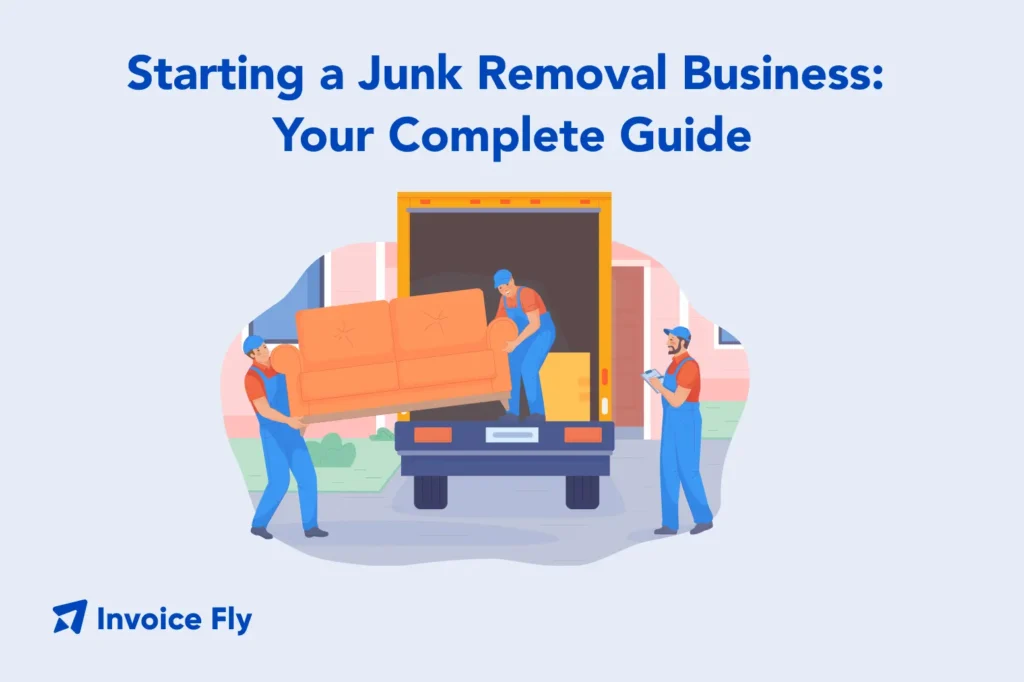Starting a Junk Removal Business: Your Complete Guide

Table of Contents
- Why Start a Junk Removal Business?
- 1. Write a Junk Removal Business Plan
- 2. Create a Junk Removal Brand
- 3. Get Set Up: Registration and Business Structure
- 4. Secure a Junk Removal Business License and the Right Permits
- 5. Get Junk Removal Business Insurance
- 6. Find Funding Sources for Your Business
- 7. Set Up Your Accounting
- 8. Price Your Junk Removal Services
- 9. Buy Basic Junk Removal Equipment
- 10. Market Your Junk Removal Services
- 11. Hire a Team to Grow Your Business
- Managing Your Growing Business
- Common Challenges and Solutions
- Final Thoughts
- FAQs about Starting Your Junk Removal Business
Ever driven past that house on your street where broken furniture sits on the curb for weeks? While your neighbor stresses about disposal, you could be making money solving their problem.
The junk removal industry is booming. Americans generate 292.4 million tons of municipal solid waste each year, and busy homeowners increasingly pay someone else to handle the heavy lifting. What started as guys with pickup trucks has evolved into a multi-billion dollar industry.
But starting a successful junk removal business isn’t just about owning a truck to haul away stuff. It requires understanding customers, following proper disposal methods, and building systems that scale. This guide covers everything you need to launch your junk removal business. From licenses to pricing. Ready to turn trash into treasure?

Why Start a Junk Removal Business?
The demand is real. Americans generate about 5 pounds of waste per person per day, and people are busier than ever. They’re willing to pay someone else to handle the heavy lifting. Whether it’s a family cleaning out their garage or a contractor who needs construction debris removed, there’s always someone who needs junk hauled away.
The junk removal industry is perfect for entrepreneurs who want to start a business with relatively low startup costs. Unlike other businesses that require expensive inventory, you mainly need a truck and the willingness to work hard.
Mike from Portland started his junk removal business three years ago with just a used pickup truck and limited savings. Today, he runs multiple trucks and employs several people. His story shows how a simple junk hauling operation can grow into a substantial business.
Here’s how to be like Mike, and start your own junk removal business:
1. Write a Junk Removal Business Plan
Before you buy your first truck, you need a solid business plan. This doesn’t have to be a 50-page document, but it should cover the basics.
Your waste disposal business plan should include:
Your target market: Homeowners cleaning out basements? Businesses doing renovations? Construction companies that need debris removal?
Services you’ll offer: Basic junk removal? Appliance pickup? Construction debris? Estate cleanouts? Recycling services?
Your competition: Research other junk removal companies in your area. What do they charge? How can you do it better?
Financial projections: How much will you charge? What are your expected monthly expenses? When do you expect to break even?
Sarah from Denver spent time researching before starting her business. She discovered that most local companies focused on residential work, so she decided to target small businesses instead. Her research helped her avoid wasting time and money on the wrong customers.
2. Create a Junk Removal Brand
Your brand is more than just a logo. It’s how customers see your business. In the junk removal industry, trust is huge. People are letting you into their homes, so you need to look professional.
Key elements of your brand:
- Business name: Choose something memorable and professional
- Logo and colors: Keep it simple and clean. Bright colors work well
- Uniforms: Even matching t-shirts with your logo look professional
- Vehicle branding: Your truck is your biggest marketing tool
- Professional attitude: Be polite, punctual, and respectful

3. Get Set Up: Registration and Business Structure
Making your business official protects you legally and helps you look professional.
Choose your business structure:
- Sole Proprietorship: Simplest option for solo operators
- LLC: Provides personal liability protection (recommended)
- Corporation: More complex but offers additional protections
Register your business name with your state and local government. Get an Employer Identification Number (EIN) for taxes, even without employees initially.
Tom from Phoenix chose the LLC structure for his business. The setup cost was relatively low, but it provided important protection for his personal assets in case of business issues.
4. Secure a Junk Removal Business License and the Right Permits
Most cities require business licenses for junk removal companies. Requirements vary by location.
Common licenses and permits:
- General business license: Required in most cities
- Waste hauler permit: Many areas require special permits
- Commercial driver’s license (CDL): May be required for larger trucks
- Recycling permits: If you plan to offer recycling services
- Dump permits: Some disposal facilities require permits
The permit process can take several weeks, so start early. Maria from Atlanta applied for permits well before launching her business and found that the waste hauler permit took longer than expected to process.
5. Get Junk Removal Business Insurance
Insurance isn’t optional in the junk removal business. You’re handling other people’s property and driving heavy trucks.
Essential coverage:
- General liability insurance: Protects if you damage customer property
- Commercial auto insurance: Covers your business vehicles
- Workers’ compensation: Required if you have employees
- Commercial property insurance: Protects your equipment
Insurance costs vary, but expect to pay $2,000-$5,000 annually for comprehensive coverage.
6. Find Funding Sources for Your Business
Startup costs are relatively low. You can start with as little as $10,000-$20,000 if you buy a used truck.
Startup costs typically include:
- Used pickup truck or box truck: $8,000-$25,000
- Dumpster rental: $300-$800 per month
- Insurance: $2,000-$5,000 annually
- Licenses and permits: $200-$1,000
- Basic equipment: $1,000-$3,000
- Marketing materials: $500-$2,000
Funding options:
- Personal savings (most common)
- Small business loans
- Equipment financing
- Family and friends
Jake from Las Vegas started with personal savings and an equipment loan for his truck. Having reliable transportation from day one helped him maintain a professional appearance with customers.
7. Set Up Your Accounting
Good bookkeeping is crucial because you’ll have lots of small transactions and variable expenses.
Essential tasks:
- Track income from each job
- Monitor fuel costs and vehicle expenses
- Record dump fees and disposal costs
- Track employee wages
- Prepare for quarterly tax payments
Choose accounting software. Open a separate business checking account and set aside 25-30% of profits for taxes.
Pro tip:
Use invoicing software like Invoice Fly to generate quotes, send invoices and receive online payments.

8. Price Your Junk Removal Services
Pricing is tricky. Charge too much, and you’ll lose customers. Charge too little, and you won’t make profit.
Common pricing models:
- Volume-based: Charge based on truck space used
- Item-based: Set prices for specific items
- Time-based: Charge by hour plus disposal fees
Typical pricing ranges:
- Minimum charge: $75-$150
- 1/4 truck load: $150-$300
- 1/2 truck load: $250-$450
- Full truck load: $450-$700
According to industry data, the average job size for junk removal companies is around $400, while residential customers typically spend $210 and businesses average $500 per service.
Additional fees:
- Heavy items: $25-$75 extra
- Multiple floors: $25-$50 per floor
- Long distance: $0.50-$1.00 per mile
Lisa from Chicago has found success with competitive pricing while focusing on reliability and service quality. She’s learned that customers are often willing to pay more for dependable, professional service.
9. Buy Basic Junk Removal Equipment
You don’t need expensive equipment to start, but you need the right tools for safety and efficiency.
Essential equipment:
Vehicle: A pickup truck or box truck is your most important investment.
Moving equipment:
- Furniture dollies
- Moving straps and rope
- Tarps to cover loads
Safety equipment:
- Work gloves
- Safety glasses
- Steel-toe boots
Basic tools:
- Screwdrivers for disassembly
- Crowbar or pry bar
- Utility knife
Start with used equipment to keep costs down. You can upgrade as your business grows.

10. Market Your Junk Removal Services
Even the best service won’t succeed without customers. Marketing doesn’t have to be expensive, but it needs to be consistent.
Low-cost strategies:
Online presence:
- Create a simple website
- Set up Google My Business listing
- Get listed on Yelp and review sites
- Use social media for before/after photos
Local marketing:
- Put magnetic signs on your truck
- Leave door hangers in neighborhoods
- Network with real estate agents
- Partner with moving companies
Referral program:
- Offer discounts for customer referrals
- Ask satisfied customers for online reviews
Dave from San Antonio has built his business primarily on referrals, with word-of-mouth recommendations making up the majority of his new customers. His success comes from consistently showing up on time and treating customers’ property with respect.
11. Hire a Team to Grow Your Business
As your business grows, you’ll need help. Hiring the right people helps you take on more jobs.
When to hire:
- When you’re turning down jobs because you’re too busy
- When you’re working 60+ hours per week consistently
What to look for:
- Reliable and punctual
- Physically fit
- Professional attitude
- Valid driver’s license
- Willing to work flexible hours
Key positions:
- Helper/Laborer: Assists with loading
- Driver: Can operate trucks and lead jobs
- Team Leader: Manages crews and handles customers
Provide workers’ compensation insurance and train employees on safety procedures and customer service standards.

Managing Your Growing Business
As you grow, you’ll need systems to handle more customers efficiently.
Key areas to focus on:
- Scheduling software to optimize routes and save fuel
- Customer records to track preferences and service history
- Disposal relationships with local dump sites and recycling centers
- Quality control checklists for consistent service
Financial metrics to track:
- Revenue per job
- Cost per mile driven
- Dump fees (industry average is 6.5% of revenue)
- Customer acquisition cost
Many successful businesses use professional invoicing software to get paid faster and track performance. This helps you create professional bills that customers can pay online.

Common Challenges and Solutions
Seasonal fluctuations: Build cash reserves during busy spring periods to cover slower winter months.
Equipment breakdowns: Have relationships with reliable mechanics and consider backup transportation.
Difficult customers: Have clear policies and don’t be afraid to walk away from problem situations.
Employee turnover: The average employee retention in junk removal is about two months. Treat employees well and pay competitive wages to keep good workers.
Final Thoughts
Starting a junk removal business can be rewarding while helping people solve real problems. The key is treating it like a real business from day one. Not just a guy with a truck.
Focus on excellent customer service, professional standards, and building systems that grow with your business. With the right approach, your junk removal business can grow from a one-person operation to a thriving company serving your entire community.
Success comes from being reliable, professional, and efficient. Customers will pay premium prices for a company they trust to show up on time, work safely, and handle their property with care.
Use digital tools like our Invoice Maker to streamline your invoicing & billing process.
By starting now and building a solid foundation, you can establish yourself as the go-to waste removal company in your area.
FAQs about Starting Your Junk Removal Business
You can start with $10,000-$20,000 for a used truck setup. Having $25,000-$30,000 gives you more flexibility and professional appearance.
Requirements vary by location. Most areas require a business license, and many require waste hauler permits. Check with local government.
A pickup truck with trailer works for residential jobs, but a box truck (14-16 feet) is more professional and efficient.
Start with Google My Business, social media, and networking with real estate agents and moving companies. Truck signage works well too.
Both have advantages. Residential is easier to start, but commercial contracts provide steady, larger jobs. Many businesses serve both.
